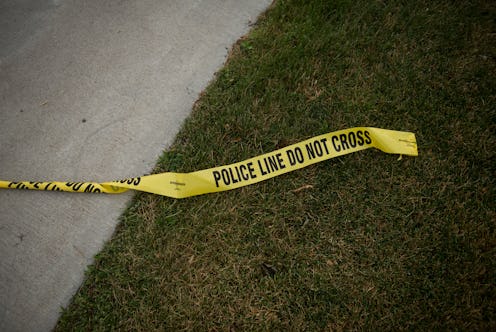News
Police Officer Fired For Not Killing Someone
Over the past couple of years, issues of lethal police violence have risen to the forefront of the American consciousness. Racial justice protesters have explicitly condemned the ease with which some police officers have killed unarmed black Americans, as well as the subsequent lack of legal accountability that often follows. Now, a police department fired an officer for not killing someone back in June, despite the fact that he accurately assessed the man in question as potentially suicidal, and not a mortal threat.
Here's how it happened, as Sean D. Hamill detailed for the Pittsburgh Post-Gazette: Stephen Mader, formerly a police officer in Weirton, West Virginia, was called to the scene of a reported domestic incident in May, and when he arrived he was met with a tense situation. Namely, a man ― since identified as 23-year-old Ronald Williams Jr. ― was holding a handgun, and he didn't drop it when ordered to.
If you're at all plugged into the recent, high-profile stories (sometimes with video) of police-involved murders, then you know just how quickly this sort of situation can escalate. But Mader didn't escalate it. According to Hamill's reporting, he leaned on his experience in profiling threats, which he reportedly gained as a Marine, noting that when he told Williams to drop the gun, the young black man replied, "Just shoot me." In the moment, Mader believed Williams to be attempting a suicide-by-cop, so he tried to diffuse the situation without loss of life.
However, things turned all too familiar when a pair of his fellow Weirton police officers arrived on the scene, and when they saw Williams brandishing his gun, they fatally shot him, according to New York Daily News. As it turned out, Mader was completely right ― the gun wasn't loaded, meaning whatever perception his erratic behavior had created, he was not a threat to their lives.
The department ultimately took action. Not against the officers who arrived and subsequently killed Williams, to be clear; rather, the department reportedly took action against Mader for failing to kill Williams before his fellow officers arrived on the scene, according to New York Daily News. Here's how Mader characterized his chief's criticism: "We’re putting you on administrative leave and we’re going to do an investigation to see if you are going to be an officer here. You put two other officers in danger."
The logic, as Mader detailed to Hamill, was that he "failed to eliminate a threat," and put the other officers in harm's way. Never mind that Williams' gun wasn't loaded and that Mader's tactics of de-escalation ultimately could've kept anyone from dying that day.
When police officers kill civilians, even unarmed ones, there's a familiar refrain that arises, both in the court of public opinion and, if it gets that far, in real court ― that if an officer is in fear for their life, they can justifiably use lethal force. What happened to Mader, however, suggests an even more problematic standard. Namely, if a cop accurately judges they're not in that danger, even in the midst of a harrowing situation, that can still be held up unfavorably against another officer's lethal response.
